Soil compaction on all farms is problematic to say the least, and always has been a key issue, widely recognised across all tillage farms. In recent years, more and more tillage farmers are taking a proactive approach to tackling compaction. In the UK and on the continent, the use of controlled traffic farming systems is gaining popularity, and it is being implemented on some farms in Ireland. This isn’t possible on all farms, but fitting replacement wider tyres is plausible on some machines.
We caught up with Wexford tillage farmer John Hayes. Based outside Wexford town, John mainly grows cereals on a range of mixed soils.
He said that winter crops suit his farm best from a labour input, an economical return point of view and his soils.
Keen to sow as much winter crops as possible each year, he invested in a huge set of 1250/50/32 flotation wheels ahead of the 2023 winter sowing season.
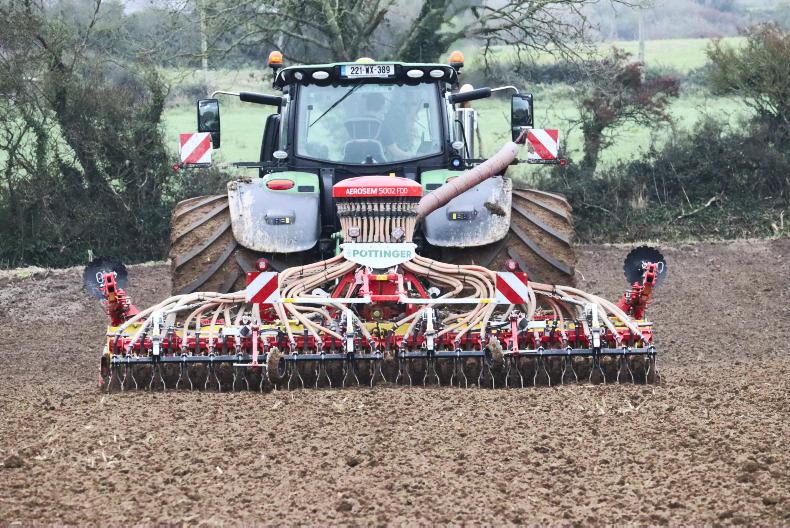
The John Deere 6250R is fitted with Alliance IF 1250/50 R32 Agriflex tyres.
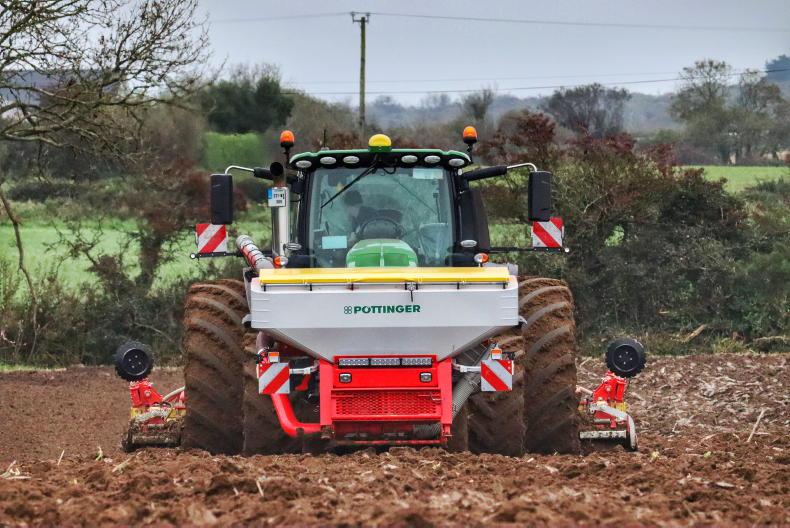
"At the back end of last year, we sowed somewhere in the region of eight to 10 acres of corn extra with the same tank of fuel".
Moving from 3m to 5m drills
Three years ago, John made the move from a 3m Kuhn Accord one-pass disc drill to a 5m Pottinger front-mounted hopper and rear-mounted power harrow drill.
The step up in drill required a step up in tractor, and so John purchased a new John Deere 6250R. The tractor was shod on Michelin MachXBib 710/70 R42s on the rear and 600/70 R30s on the front.
“In good conditions, the tractor and drill combination sowed away without any problems. When the going got difficult, the tractor would start to sink and the drill would begin to drag.
“This meant that I was having to run the power harrow deeper in order to try and alleviate any potential compaction issues I was causing. This was slowing me down and burning more diesel. Anywhere that I didn’t run the power harrow that bit deeper, it was clearly evident in the crop that emerged. I was thinking of making the move to a bigger set of tyres for a while, and eventually I bit the bullet,” John explained.

"We are running the IF tyre at 14 PSI, which probably pushed it to around 1,300m wide".
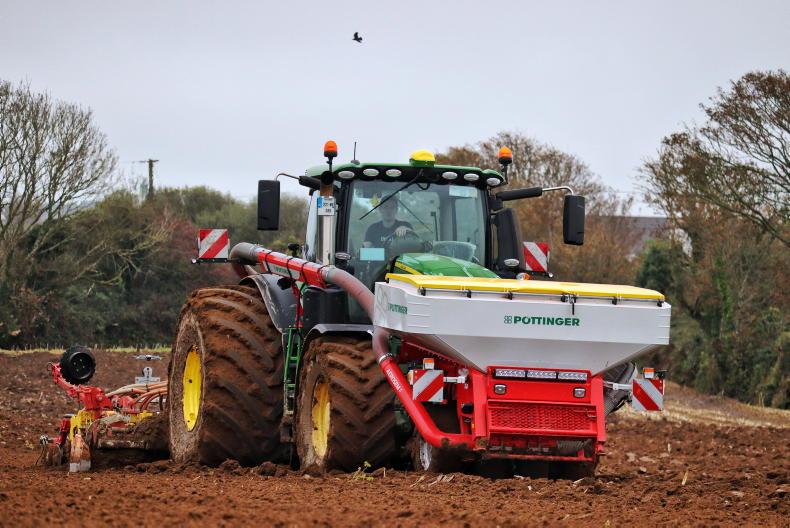
IF tyres can carry load at 20% lower pressure than a standard tyre, or carry 20% more load at the same pressure.
Bigger wheels
“We initially approached Kevin Burke Tyres (KBT) about purchasing rims and 900mm wide tyres for the rear of our tractor. Kevin was of the opinion that we would gain very little from moving from the high-rim 710 tyre, to a smaller rim 900 tyre. We went back to the drawing board and were considering 1,050s, but Kevin felt a set of 1,250s would be the right decision. We weren’t convinced at the time and didn’t know of anyone who had gone as wide, but decided to take his advice and we took the plunge. We ended up fitting Alliance IF 1250/50 R32 Agriflex tyres.”
The tractor was brought up KBT’s base in Athenry, Co Galway, and it was measured up. Kevin Burke says that modern tractors tend to have larger diesel tanks, and nowadays often AdBlue tanks are placed within the vicinity of the wheel arches. Sometimes, this means that more of an offset has to be implemented when making the rim. The two 44-inch-wide rims were made and painted in-house by KBT. The total wheel cost came to €12,000, plus VAT.

The two 44-inch-wide rims were made and painted in-house by KBT.
First season complete
“With one planting season under our belts, we are delighted with the decision. We can now drive out over ploughed ground, and the tractor might only sink into it by two inches.
“I’d say we managed to sow an extra 60 to 100 acres last autumn with the addition of the big wheels. It has taken the pressure off the drill, there is no drag on it anymore. We’re able to get through more ground in the day, and burn less fuel.
“We estimate that in the not-so-favourable conditions at the back end of last year, we sowed somewhere in the region of eight to 10 acres of corn extra, with the same tank of fuel.
“We are running the IF tyre at 14 PSI, which probably pushed it to around 1,300m wide. But it’s the extra lug on the ground where we are seeing the real benefit of running it at the lower pressure. We only use the tyres for winter and spring sowing, and swap back on the tractor’s original tyres again for the summer months. Although it looks very wide, it measures 11ft 10in. We are lucky that all of the gateways and roads we use to sow our fields all have good access and are wide. We’re hoping to get at least 10 to 12 years out of the set of tyres. Between more output, less fuel and less compaction, I think it was money well spent and the tyres will pay for themselves over a couple of years.
“On the front, we are running the Michelin tyres at 15/16 PSI. We initially said we would just try and fit the flotation tyres on the rear, as the front hopper on the drill runs on four tyres itself.
“The 600s on the front at low pressure are working well, but when we see the benefits of running the IF technology and wider tyres, we are now planning on fitting a wider set of wheels to the front of the tractor. To match up with the ratio at the rear, we are looking at fitting a set of 750s, although I would have loved to have gone to 800s.”
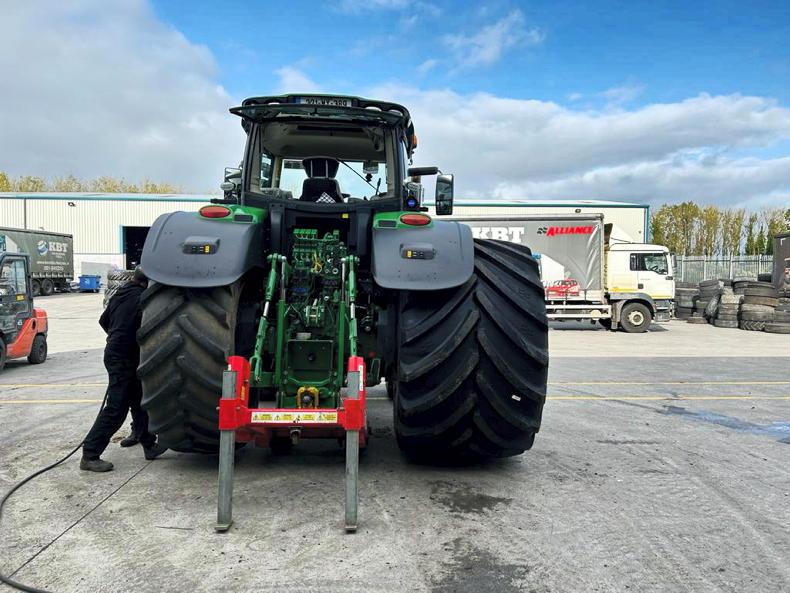
L/R- The Michelin MachXBib 710/70 R42 vas the Alliance IF 1250/50 R32 Agriflex tyre.
IF and VF technology
More and more tyre manufacturers are offering increased flexion (IF) and very high flexion (VF) high-deflection tyre carcases. IF tyres can carry loads at 20% lower pressure than a standard tyre, or carry 20% more load at the same pressure.
VF tyres can carry loads at 40% lower pressure than normal, or similarly carry 40% more load than a standard tyre.
This technology in tyres also allows a longer section of the tyre to be in contact with the ground, lowering ground pressure and adding traction benefits.
However, such tyres come at a considerable price premium in comparison to tyres of similar dimensions.
Speaking to Kevin Burke about prices, he said that IF and VF tyres vary from 20% to 40% more expensive than standard tyres. However, as the number of manufacturers offering IF/VF tyres increase, this premium should drop.
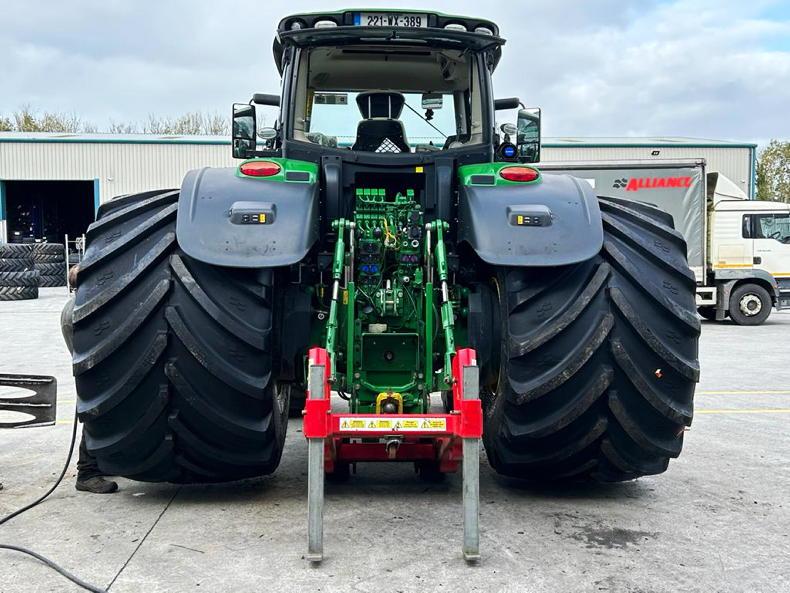
The 1250/50 R32 tyres once fitted to John's John Deere 6250R.
Soil compaction on all farms is problematic to say the least, and always has been a key issue, widely recognised across all tillage farms. In recent years, more and more tillage farmers are taking a proactive approach to tackling compaction. In the UK and on the continent, the use of controlled traffic farming systems is gaining popularity, and it is being implemented on some farms in Ireland. This isn’t possible on all farms, but fitting replacement wider tyres is plausible on some machines.
We caught up with Wexford tillage farmer John Hayes. Based outside Wexford town, John mainly grows cereals on a range of mixed soils.
He said that winter crops suit his farm best from a labour input, an economical return point of view and his soils.
Keen to sow as much winter crops as possible each year, he invested in a huge set of 1250/50/32 flotation wheels ahead of the 2023 winter sowing season.

The John Deere 6250R is fitted with Alliance IF 1250/50 R32 Agriflex tyres.

"At the back end of last year, we sowed somewhere in the region of eight to 10 acres of corn extra with the same tank of fuel".
Moving from 3m to 5m drills
Three years ago, John made the move from a 3m Kuhn Accord one-pass disc drill to a 5m Pottinger front-mounted hopper and rear-mounted power harrow drill.
The step up in drill required a step up in tractor, and so John purchased a new John Deere 6250R. The tractor was shod on Michelin MachXBib 710/70 R42s on the rear and 600/70 R30s on the front.
“In good conditions, the tractor and drill combination sowed away without any problems. When the going got difficult, the tractor would start to sink and the drill would begin to drag.
“This meant that I was having to run the power harrow deeper in order to try and alleviate any potential compaction issues I was causing. This was slowing me down and burning more diesel. Anywhere that I didn’t run the power harrow that bit deeper, it was clearly evident in the crop that emerged. I was thinking of making the move to a bigger set of tyres for a while, and eventually I bit the bullet,” John explained.

"We are running the IF tyre at 14 PSI, which probably pushed it to around 1,300m wide".

IF tyres can carry load at 20% lower pressure than a standard tyre, or carry 20% more load at the same pressure.
Bigger wheels
“We initially approached Kevin Burke Tyres (KBT) about purchasing rims and 900mm wide tyres for the rear of our tractor. Kevin was of the opinion that we would gain very little from moving from the high-rim 710 tyre, to a smaller rim 900 tyre. We went back to the drawing board and were considering 1,050s, but Kevin felt a set of 1,250s would be the right decision. We weren’t convinced at the time and didn’t know of anyone who had gone as wide, but decided to take his advice and we took the plunge. We ended up fitting Alliance IF 1250/50 R32 Agriflex tyres.”
The tractor was brought up KBT’s base in Athenry, Co Galway, and it was measured up. Kevin Burke says that modern tractors tend to have larger diesel tanks, and nowadays often AdBlue tanks are placed within the vicinity of the wheel arches. Sometimes, this means that more of an offset has to be implemented when making the rim. The two 44-inch-wide rims were made and painted in-house by KBT. The total wheel cost came to €12,000, plus VAT.

The two 44-inch-wide rims were made and painted in-house by KBT.
First season complete
“With one planting season under our belts, we are delighted with the decision. We can now drive out over ploughed ground, and the tractor might only sink into it by two inches.
“I’d say we managed to sow an extra 60 to 100 acres last autumn with the addition of the big wheels. It has taken the pressure off the drill, there is no drag on it anymore. We’re able to get through more ground in the day, and burn less fuel.
“We estimate that in the not-so-favourable conditions at the back end of last year, we sowed somewhere in the region of eight to 10 acres of corn extra, with the same tank of fuel.
“We are running the IF tyre at 14 PSI, which probably pushed it to around 1,300m wide. But it’s the extra lug on the ground where we are seeing the real benefit of running it at the lower pressure. We only use the tyres for winter and spring sowing, and swap back on the tractor’s original tyres again for the summer months. Although it looks very wide, it measures 11ft 10in. We are lucky that all of the gateways and roads we use to sow our fields all have good access and are wide. We’re hoping to get at least 10 to 12 years out of the set of tyres. Between more output, less fuel and less compaction, I think it was money well spent and the tyres will pay for themselves over a couple of years.
“On the front, we are running the Michelin tyres at 15/16 PSI. We initially said we would just try and fit the flotation tyres on the rear, as the front hopper on the drill runs on four tyres itself.
“The 600s on the front at low pressure are working well, but when we see the benefits of running the IF technology and wider tyres, we are now planning on fitting a wider set of wheels to the front of the tractor. To match up with the ratio at the rear, we are looking at fitting a set of 750s, although I would have loved to have gone to 800s.”

L/R- The Michelin MachXBib 710/70 R42 vas the Alliance IF 1250/50 R32 Agriflex tyre.
IF and VF technology
More and more tyre manufacturers are offering increased flexion (IF) and very high flexion (VF) high-deflection tyre carcases. IF tyres can carry loads at 20% lower pressure than a standard tyre, or carry 20% more load at the same pressure.
VF tyres can carry loads at 40% lower pressure than normal, or similarly carry 40% more load than a standard tyre.
This technology in tyres also allows a longer section of the tyre to be in contact with the ground, lowering ground pressure and adding traction benefits.
However, such tyres come at a considerable price premium in comparison to tyres of similar dimensions.
Speaking to Kevin Burke about prices, he said that IF and VF tyres vary from 20% to 40% more expensive than standard tyres. However, as the number of manufacturers offering IF/VF tyres increase, this premium should drop.

The 1250/50 R32 tyres once fitted to John's John Deere 6250R.













 This is a subscriber-only article
This is a subscriber-only article










SHARING OPTIONS: